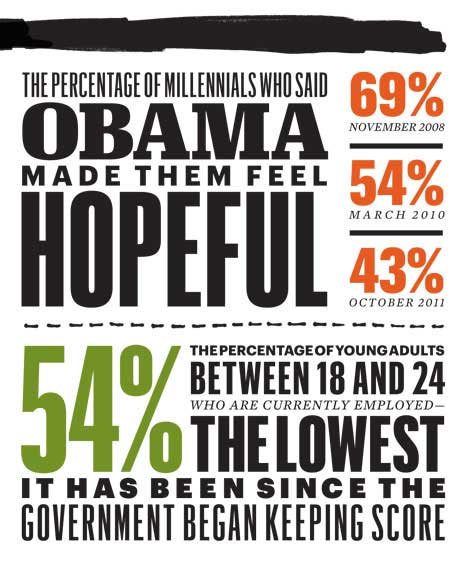The Youth Vote: Unemployment Among College Graduates

According to Pew Research Center data, 66% of individuals under the age of 30 voted for Barack Obama in the 2008 election. Republican Senator John McCain received only 32% of votes from the same age demographic. Because of their large contribution to his last victory, the Obama campaign has been focusing its energy on recapturing their vote in the upcoming November election.
That might be a more difficult task this time around as the approval rating for the President, among young voters, has declined during his time in office. Recently graduated college students, many of whom were Obama supporters in 2008, are facing extremely high unemployment rates. According to an Associated Press analysis of government data,
“Roughly 1.5 million, or 53.6 percent, of bachelor's degree holders under the age of 25 were underemployed or jobless last year. The split between jobless and underemployed among the group was about half and half.”
Last year’s job prospects for individuals recently awarded a bachelor’s degree were at the lowest point in over 10 years, the AP found. College graduates simply are not obtaining the kinds of jobs they once were, as current underemployed graduates are not getting jobs that do not utilize the skills and knowledge they worked for, and paid for, in college.
Combine these high unemployment rates with student loans that students are required to start paying back about six months after graduating, and you have a section of the populace facing some huge challenges. The Obama campaign however, has a plan to combat some of the unease currently facing young voters.
The President has promised his support for maintaining 3.4% interest rates for student loans. Throughout his college tour last week, he visited campuses in Colorado, Iowa, and North Carolina spreading that message in hope of repeating his previous youth vote majority of 2008. While the House passed a bill that would extend the current interest rate through next year, it has yet to make it through the Senate. If the Senate fails to act, interest rates on student loans will double on July 1st.
Data from a new Harvard Poll showed that President Obama led the youth vote by 12 points over Romney. Though young people agree that Obama will likely win reelection, their approval for the president is nowhere near what it was four years ago. The Obama campaign visited 130 university and school campuses between March 2011 and March 2012 in hopes of gaining the youth vote. Will this be enough however, to gain him the support he enjoyed in 2008?





